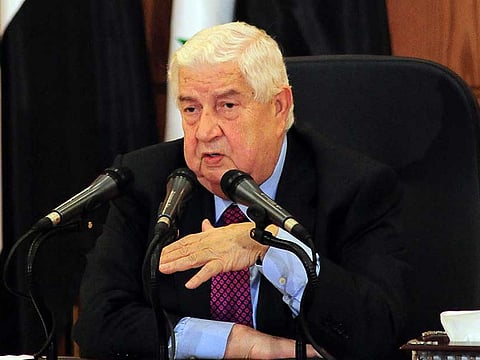Syria rejects UN monitors for safe zone deal
Syrian Kurds fighting Daesh are ‘legitimate’ forces, says Mua’allem

Damascus: Syrian Foreign Minister Walid Mua’allem said on Monday his country would reject any United Nations role in monitoring the implementation of four “de-escalation” or safe zones.
“We do not accept a role for the United Nations or international forces to monitor the agreement,” Mua’allem told reporters in Damascus.
A spokesman for the UN secretary general’s special envoy to Syria, Staffan de Mistura, declined to comment on those remarks.
Mua’allem also said the United States seemed to have concluded that it must reach an understanding with Russia for a solution to the Syrian crisis.
He warned that if Jordanian forces entered Syria without coordinating with Damascus, it would be considered an act of aggression, but that Syria was not about to confront Jordan.
Speaking about the military situation inside Syria, Mua’allem said Deir Al Zor, a city and province occupied by Daesh in the east, was the “fundamental objective” for government forces and was more important to the average Syrian than Idlib, a northwestern province that is an opposition stronghold.
Asked about US backing for Kurdish groups fighting Daesh in northeast Syria, he said that what Syrian Kurds were doing in fighting the terrorist group was “legitimate” at this stage and falls within the framework of preserving Syrian unity.
Regime backers Russia and Iran and rebel supporter Turkey reached a deal on Thursday on four safe zones in Syria where the government and opposition will halt hostilities.
The deal says those areas would be bordered by “security zones” with checkpoints and observation centres “ensured by the forces of the guarantors by consensus”, but that “third-party” monitors could also be deployed.
Mua’allem on Monday said there could be a role “as the Russian guarantor has said, for military police”, but it was unclear if he was referring to Syrian or foreign units.
The multiphase plan, signed on Thursday in the Kazakh capital Astana, is one of the more ambitious efforts aimed at ending Syria’s six-year conflict.
It provides for a ceasefire, rapid deliveries of humanitarian aid and the return of refugees after “de-escalation zones” are created across stretches of eight Syrian provinces.
More than 465,000 people have been killed since Syria’s conflict erupted in March 2011.



